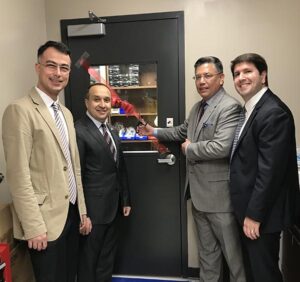New Biomedical Microdevices Lab Opens on Campus
A new laboratory has opened on campus that will allow scientists to create devices with features smaller than a human hair, supporting advances in biomedical engineering.
 The Biomedical Microdevices Lab (BML), located in room 415 of Libermann Hall, features a 220-square foot cleanroom—which is a room designed to maintain extremely low levels of particulates like dust, airborne organisms and vaporized particles—with instrumentation capable of fabricating device features down to 5 micrometers. It is the third academic micro/nanofabrication cleanroom facility in Pittsburgh.
The Biomedical Microdevices Lab (BML), located in room 415 of Libermann Hall, features a 220-square foot cleanroom—which is a room designed to maintain extremely low levels of particulates like dust, airborne organisms and vaporized particles—with instrumentation capable of fabricating device features down to 5 micrometers. It is the third academic micro/nanofabrication cleanroom facility in Pittsburgh.
The state-of-the-art facility will enable researchers to design and fabricate devices at micro and nanoscales for studying biomolecules and cells toward a broader understanding of various human diseases. The BML offers a comprehensive set of microfabrication and microscopy equipment to develop new micro and nanoscale devices, such as lab-on-a-chip devices and microfluidic systems.
The lab is directed by Assistant Professor Dr. Melikhan Tanyeri in the Department of Engineering at Rangos School of Health Sciences. He is currently developing novel engineering tools and methods based on micro/nanotechnology to better understand molecular mechanisms of disease and develop portable diagnostic devices.
The BML is open to the Duquesne research community, including faculty, undergraduate and graduate students, and postdoctoral fellows. Training and collaboration opportunities are available to facilitate research at the interface of engineering and chemical, biological and pharmaceutical sciences.
